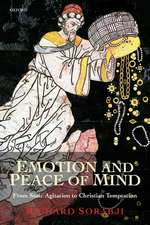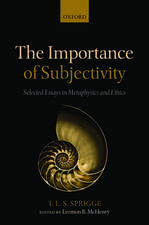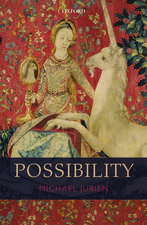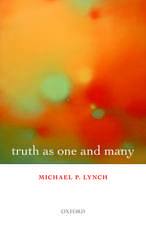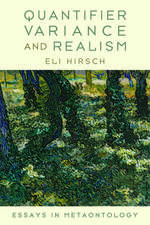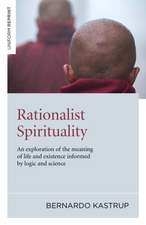Self: Ancient and Modern Insights about Individuality, Life, and Death
Autor Richard Sorabjien Limba Engleză Hardback – 14 sep 2006
| Toate formatele și edițiile | Preț | Express |
|---|---|---|
| Paperback (2) | 263.20 lei 32-37 zile | |
| OUP OXFORD – 6 noi 2008 | 263.20 lei 32-37 zile | |
| University of Chicago Press – 31 oct 2008 | 273.97 lei 6-8 săpt. | |
| Hardback (2) | 186.88 lei 32-37 zile | |
| OUP OXFORD – 14 sep 2006 | 186.88 lei 32-37 zile | |
| University of Chicago Press – 4 feb 2013 | 589.04 lei 6-8 săpt. |
Preț: 186.88 lei
Preț vechi: 219.90 lei
-15% Nou
Puncte Express: 280
Preț estimativ în valută:
35.76€ • 38.97$ • 30.13£
35.76€ • 38.97$ • 30.13£
Carte tipărită la comandă
Livrare economică 14-19 aprilie
Preluare comenzi: 021 569.72.76
Specificații
ISBN-13: 9780199266395
ISBN-10: 0199266395
Pagini: 416
Dimensiuni: 159 x 237 x 29 mm
Greutate: 0.76 kg
Editura: OUP OXFORD
Colecția OUP Oxford
Locul publicării:Oxford, United Kingdom
ISBN-10: 0199266395
Pagini: 416
Dimensiuni: 159 x 237 x 29 mm
Greutate: 0.76 kg
Editura: OUP OXFORD
Colecția OUP Oxford
Locul publicării:Oxford, United Kingdom
Recenzii
a fascinating excursion into important area of philosophy. The richness of the tradition that Sorabji presents so deftly shows how important questions about the self are.
So rich and complex a work as this can hardly be expected to elicit the complete agreement of any reader, but I am persuaded that it will prove intellectually fecund for all.
extraordinarily rich and provocative book...[Sorabji's] accomplishments in this book are outstanding...Anyone interested in the history and/or contemporary theory of the self and related notions would profit from reading it.
His book is a historical tour de force, and it also helps to give context and perspective to classic ideas of self...Sorabji's approach is sufficiently analytical to engage philosophers, and comprehensive enough to appeal to more general readers in search of more selective enlightenment.
Sorabji's book has the immense virtue of allowing us to discover a vast corpus of texts dealing with the problem of self. The learned and thoughtful review of philosophical perspectives has a remarkably wide range that you will not find anywhere else. Undoubtedly, this work will turn out to be an indispensable reference for any readers wishing to broaden their minds beyond contemporary Western philosophy.
[a] remarkably versatile and enthusiastic exploration of ancient thinking about selfhood... There has never been a book remotely like this one in its profusion of ancient references on ideas about human identity and selfhood and the sheer quantity of information it provides, all admirably furnished with up-to-date bibliography and footnotes... [a] historical tour de force.
a fascinating excursion into a crucial area of philosophy. The richness of the historical tradition that Sorabji presents so deftly shows how impotant these questions about the Self are.
So rich and complex a work as this can hardly be expected to elicit the complete agreement of any reader, but I am persuaded that it will prove intellectually fecund for all.
extraordinarily rich and provocative book...[Sorabji's] accomplishments in this book are outstanding...Anyone interested in the history and/or contemporary theory of the self and related notions would profit from reading it.
His book is a historical tour de force, and it also helps to give context and perspective to classic ideas of self...Sorabji's approach is sufficiently analytical to engage philosophers, and comprehensive enough to appeal to more general readers in search of more selective enlightenment.
Sorabji's book has the immense virtue of allowing us to discover a vast corpus of texts dealing with the problem of self. The learned and thoughtful review of philosophical perspectives has a remarkably wide range that you will not find anywhere else. Undoubtedly, this work will turn out to be an indispensable reference for any readers wishing to broaden their minds beyond contemporary Western philosophy.
[a] remarkably versatile and enthusiastic exploration of ancient thinking about selfhood... There has never been a book remotely like this one in its profusion of ancient references on ideas about human identity and selfhood and the sheer quantity of information it provides, all admirably furnished with up-to-date bibliography and footnotes... [a] historical tour de force.
a fascinating excursion into a crucial area of philosophy. The richness of the historical tradition that Sorabji presents so deftly shows how impotant these questions about the Self are.
Notă biografică
Richard Sorabji is emeritus professor of ancient philosophy at King’s College London and a fellow of Wolfson College, University of Oxford. Besides coediting The Ethics of War: Shared Problems in Different Traditions, and editing seventy volumes so far of The Ancient Commentators on Aristotle, he is the author of Matter, Space and Motion; Animal Minds and Human Morals; Emotion and Peace of Mind; Aristotle on Memory; Necessity, Cause and Blame; and Time, Creation and the Continuum, the last three of which are also published by the University of Chicago Press.
Cuprins
List of abbreviations
Acknowledgments
Introduction
Part I: Existence of Self and philosophical development of the idea
1 The Self: is there such a thing?
2 The varieties of self and philosophical development of the idea
Part II: Personal identity over time
3 Same person in eternal recurrence, resurrection, and teletransportation
4 Stoic fusion and modern fission: Survival cannot depend on what happens to someone else
5 Memory: Locke’s return to Epicureans and Stoics
Part III: Platonism: impersonal selves, bundles, and differentiation
6 Is the true self individual in the Platonist tradition from Plato to Averroës?
7 Bundles and differentiation of individuals
Part IV: Identity and persona in ethics
8 Individual persona vs. universalizability
9 Plutarch: narrative and a whole life
10 Self as practical reason: Epictetus’ inviolable self and Aristotle’s deliberate choice
Part V: Self-awareness
11 Impossibility of self-knowledge
12 Infallibility of self-knowledge: Cogito and Flying Man
13 Knowing self through others versus direct and invariable self-knowledge
14 Unity of self-awareness
Part VI: Ownerless streams of consciousness rejected
15 Why I am not a stream of consciousness
16 The debate between ancient Buddhism and the Nyaya school
Part VII: Mortality and loss of self
17 How might we survive death?
18 Could we survive through time going in a circle?
19 If we do not survive death, is it irrational to feel dismay?
Table of thinkers
Select bibliography of secondary literature
General index
Index locorum
Acknowledgments
Introduction
Part I: Existence of Self and philosophical development of the idea
1 The Self: is there such a thing?
2 The varieties of self and philosophical development of the idea
Part II: Personal identity over time
3 Same person in eternal recurrence, resurrection, and teletransportation
4 Stoic fusion and modern fission: Survival cannot depend on what happens to someone else
5 Memory: Locke’s return to Epicureans and Stoics
Part III: Platonism: impersonal selves, bundles, and differentiation
6 Is the true self individual in the Platonist tradition from Plato to Averroës?
7 Bundles and differentiation of individuals
Part IV: Identity and persona in ethics
8 Individual persona vs. universalizability
9 Plutarch: narrative and a whole life
10 Self as practical reason: Epictetus’ inviolable self and Aristotle’s deliberate choice
Part V: Self-awareness
11 Impossibility of self-knowledge
12 Infallibility of self-knowledge: Cogito and Flying Man
13 Knowing self through others versus direct and invariable self-knowledge
14 Unity of self-awareness
Part VI: Ownerless streams of consciousness rejected
15 Why I am not a stream of consciousness
16 The debate between ancient Buddhism and the Nyaya school
Part VII: Mortality and loss of self
17 How might we survive death?
18 Could we survive through time going in a circle?
19 If we do not survive death, is it irrational to feel dismay?
Table of thinkers
Select bibliography of secondary literature
General index
Index locorum

